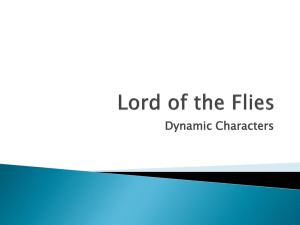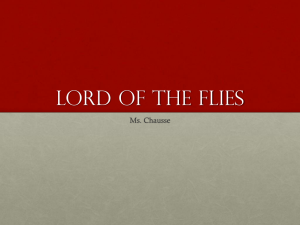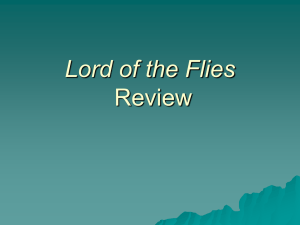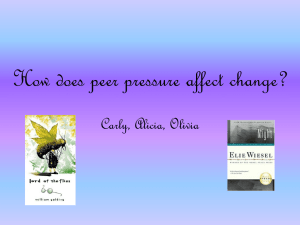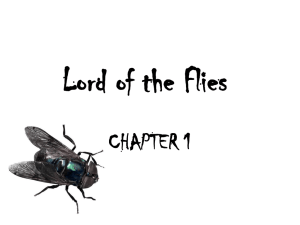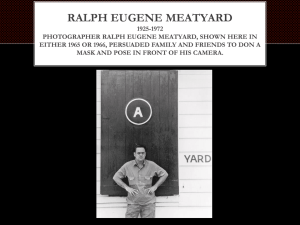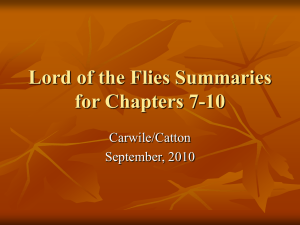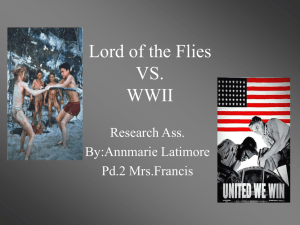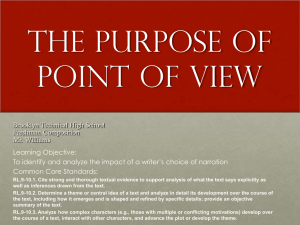7-9 - Kierstead`s St. Andrew`s Web Page
advertisement
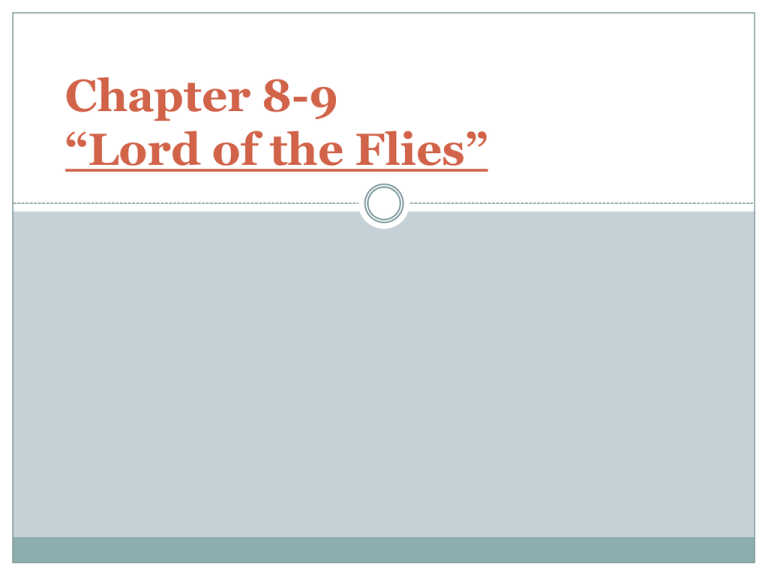
Chapter 8-9 “Lord of the Flies” Prior to the test: Define the following terms on a piece of lined paper. Use your “Mastery Word List”. Apostrophe Assonance Fantasy Dialogue Epiphany Flashback Review Ch. 8 Chapter 8: Background Information: Beelzebub “Lord of the Flies” is an almost literal transliteration of the Hebrew “Beelzebub,” a biblical demon, sometimes referred to as the devil. This demonic figure had command over disease as flies congregate around the corpses of the dead and spread disease from the dead to the living. Questions: 1. Why did Jack leave the assembly in tears and run away into the forest alone? Jack left the assembly for the forest in order to make a strong statement of his own position and to show his antagonism toward Ralph. 2. Why did Piggy decide that a fire should be built near the bathing pool rather than on the mountain? Piggy decided that the fire should be near the bathing pool because he did not want the fire to be near the beast. 3. When did it become clear to Ralph that the boys on the island had definitely split into two separate camps? Who were the members of each group? What were the values of each? When the fire diminished, Ralph realized that some of the boys had run off to Jack, Maurice, Bill and Roger. Questions 4. Why did Jack and his followers save the sow’s head? They saved the sow’s head as an offering or a gift of appeasement to the beast. 5. Who recognized the Sow’s head as the “Lord of the Flies”? What profound knowledge did he receive as he hallucinated in the presence of the head? Simon recognized the Sow’s head on a stick as the “Lord of the Flies”. He imagined that it represented all that was evil and irrational within himself and all of the boys. 6. Why was Ralph concerned about keeping a fire? Why do you think Jack and his followers did not care about keeping their own fire? Ralph wanted to be rescued, Jack and his followers did not want to be rescued. 7. What advantage did Jack gain over Ralph because of the paint on his face? The paint on his face was like a mask that permitted Jack to act daringly without self-consciousness or shame. Literary Devices: I. Irony—Why is it ironic that bright flowers and butterflies appear at the scene where the sow is dying? II. Symbolism—What was the symbolic significance of Jack’s raid on Ralph’s camp in order to obtain fire? Chapter 9/10 Study Guide Simon Ch. 9 1. When he regained consciousness after his fit, what knowledge did Simon feel compelled to reveal to the boys? Why did he feel this was critical to them? Having been the only one to view the “beast” close up, Simon felt compelled to tell the boys the true nature of the creature that was the object of their fear. Jack Vs Ralph 2. How did Jack and his followers respond to the rain? What was Ralph’s concern? What more did this reveal about the difference between Jack and Ralph? In response to the rain, Jack’s followers danced and chanted. Ralph was more concerned with caring for the shelters. Jack – Savage Ralph- Civilized Chapter 10 3. Why was Ralph particularly frightened by Simon’s death? Why did all of the boys except Ralph push the knowledge of Simon’s death out of their conscious memory? Ralph was frightened by the knowledge of his own barbarism. The nature of Simon’s death was too brutal and guilt-provoking for the boys to face. 4. Why did Ralph fear that his tribe could not survive? Ralph feared that his remaining tribe of four— himself, Piggy, and the twins—would not be able to keep the fire going and therefore would not be rescued, which he equated with survival. 5. What caused Roger to contemplate “the possibilities of irresponsible authority”? Wilfred’s irrational punishment provoked Roger to realize that the tribe had given Jack license for uncontrolled violence. 6. Why was Jack still defending his stronghold against the beast? Jack still defended his stronghold against the beast because he understood that his band would remain united only against a common enemy. 7. Why did Jack and two of his tribe attack Ralph’s encampment? Why were they successful? Jack and two of his tribe attacked Ralph’s encampment because they wanted Piggy’s glasses as a tool to start fires. Their attack was successful because of their superior strength. Literary Devices: I. Personification—What is being personified in the following passage? Power lay in the brown swell of his [Jack’s] forearms: authority sat on his shoulder and chattered in his ear like an ape. II. Irony—What was the irony of the situation commented upon after Simon was beaten to death? Even in the rain they could see how small a beast it was; . . . Pathetic fallacy Pathetic fallacy… It's when a writer uses elements of the natural world (weather, nature, animals, and so on) to reflect what happens in the book. After Simon's death, as the storm clears, there's an unusual section at the end of the chapter in which the weather clears and nature seems to almost reabsorb Simon. “Towards midnight the rain ceased and the clouds drifted away, so that the sky was scattered once more with the incredible lamps of stars” Chapter 11 Study Guide Ch. 11 LORD OF THE FLIES: Chapter 11 Questions: 1. Compare this time when Ralph blew the conch to call an assembly with the first time he called an assembly on the island. 1. Both times, the birds responded to the sound of the conch. But at that first assembly, all the boys responded to the conch and Ralph and Piggy were optimistic about the future. Now they were only four boys and a couple of stray littluns in response to the conch and Ralph and Piggy were both pessimistic as the fire had been stolen and Piggy was unable to see, only able to move with assistance. 2 2. Why did Piggy want to take the conch with him when he visited Jack’s encampment? 2. Piggy wanted to take the conch with him because he still believed it was a symbol of power and authority. This was denied when it was described as “fragile and white.” 3 3. Why did Piggy think he might be successful when he asked for his glasses back from Jack? How did this show another way that Piggy lacked vision? 3. Piggy thought he would be successful because he would not challenge Jack’s physical power, but would appeal to his sense of right and wrong. In a figurative sense, this showed that Piggy was shortsighted, unable to see Jack for the barbarian he really was. 4. Why did Ralph visit Jack and his boys on their side of the island? How did he get sidetracked from his original purpose? 4. Ralph came to Jack’s side of the island for Piggy’s glasses and fire. He was side-tracked by a physical confrontation with Jack. 5. What do you think Ralph’s retreat from Jack and his boys at their camp revealed about the character of the former chief ? Questions for Discussion: 1. Do you think there was any way that Ralph and Piggy might have wrested fire and Piggy’s glasses successfully from Jack? Or should they have accepted it as a lost cause? 2. What quality did Ralph exhibit that made Sam and Eric doubt his leadership abilities? 3. Do you think there was anything that Piggy might have said to Jack’s boys when he gained their silence with the conch that would have persuaded them to accept reason? How did he lose their support? 4. Why do you think it was Roger, and not Jack, who unleashed the rock that caused the fatal blow to Piggy? 5. What do you think Ralph’s retreat from Jack and his boys at their camp revealed about the character of the former chief ? Literary Devices: I. Symbolism—What did the breaking of the conch and Piggy’s death symbolize? II. Irony—What was ironic about Ralph’s question to Jack and his boys when he asked, “Don’t you understand”? Chapter 12 Study Guide Lord of the Flies: Ch. 12 Questions: 1. Why hadn’t Jack and his boys pursued Ralph? 1. Jack and his boys did not pursue Ralph because they seemed terrified of going into the dark forest and preferred to return to the safety of Castle Rock. 2. When did Ralph know it was hopeless to think he could ever win back the boys, or even start a small outlaw band? 2. Ralph knew it was hopeless to start a new band once Sam and Eric joined the savages, Piggy died, and the conch was smashed. 3. Why did Ralph lash out at the pig’s skull when he encountered it in the forest? 3. Ralph succumbed to superstitious fear and lashed out at the skull in the forest. He continued to fear its gaze even after he had severed it into two pieces. 4. What did Sam and Eric mean when they answered Ralph’s questions by saying, “Roger sharpened a stick at both ends”? 4. Sam and Eric were suggesting that Ralph was going to be killed like the pig and that his head would be stuck on the spear. 5. In what ways did Ralph become as savage as Jack and his followers? 5. It is clear that Ralph became as savage as Jack and his followers by his dirty, unkempt appearance, his desire for meat, and his engagement in rough physical combat. 6. Why did Ralph now condemn the fire that Jack’s boys set on the island? 6. Although Ralph had encouraged Jack to maintain a fire, he now condemned the fire that was set to smoke him out, but would also devastate the island burning edible vegetation and possibly killing pigs. 7. Why was the British officer puzzled by the condition of the boys he found on the island? 7. The British officer, knowing that these boys had been brought up in an orderly society, was puzzled to find boys who had obviously become savages on their own. 8. Why did Ralph sob as he and the remaining boys were being rescued? 8. Ralph sobbed as he and the boys were being rescued because he realized he had lost his optimism, understood the evil nature of humanity, and regretted the loss of Piggy whose wisdom and friendship he had never appreciated. Questions for Discussion: 1. Why do you think Ralph was unable to grasp the serious danger he was in at the hands of Jack and the boys? 2. Why do you think Jack felt compelled to kill Ralph? 3. In your opinion, should the boys have been rescued at the end of the book? 4. Do you think this book provided a comment on the way boys would behave on their own without adult supervision, or was it a comment on human nature, or both? Literary Devices: I. Deus ex Machina—A deus ex machina is any improbable device used to resolve the difficulties of a plot. In Greek drama, it was the intervention of a god who resolved the entanglements of the play. The literal meaning is “god from a machine,” referring to the stage apparatus from which the actor would fly into the set. How was the officer’s arrival in the last chapter of Lord of the Flies a parody of this classical device? II. Irony—Why was it ironic that Jack used fire to capture Ralph? Test #4 Deus ex machina Pathetic fallacy Allegory Ego/ID Symbols Beelzebub
